Jul 1, 2017
TSN.ca's Canada 150: Iconic Olympics moments
In honour of Canada's 150th birthday, TSN.ca looks at the iconic moments in Canadian sports history. Here's a look at memorable times from the Olympics.
, TSN.ca Staff
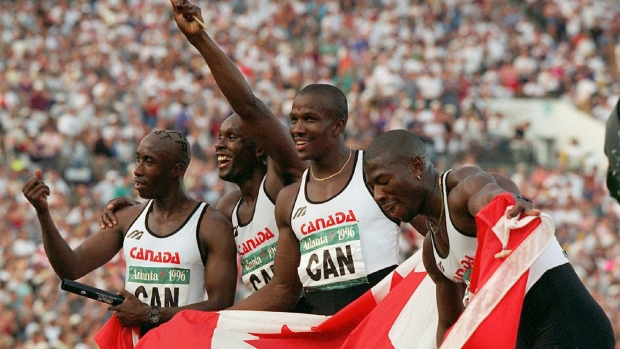
In honour of Canada's 150th birthday, TSN.ca looks at the iconic moments in Canadian sports history.
Here's a look at memorable times from the Olympics:
--
September 24, 1904 – Richmond, Ontario’s George Lyon claims gold in golf at the 1904 Summer Olympics in St. Louis. Lyon, the only Canadian competitor in the knockout field of 32 among 31 Americans, defeated Charles Egan 3&2 in the match play final at Glen Echo Golf Club. An avid cricket player, Lyon would win the Canadian Amateur Championship a record eight times between 1918 and 1930. He remained the last man to win an Olympic gold in golf until the 2016 Olympic Games in Rio de Janeiro when golf returned and Great Britain’s Justin Rose won gold.
--
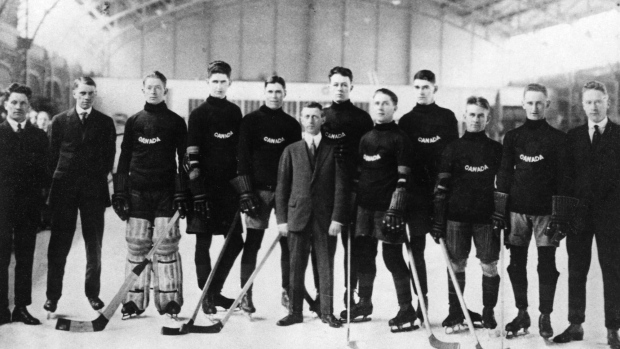
April 26, 1920 – For the first time at the Winter Olympics, hockey would be contested as a medal sport in Antwerp. Canada’s entry was the amateur Winnipeg Falcons, winner of that year’s Allan Cup, awarded to Canada’s senior ice hockey champions. The Falcons would add to their haul that spring when they outscored their opponents (Czechoslovakia, the United States and Sweden) by a combined score of 29-1 on their way to inaugural hockey gold medal.
--
July 30, 1928 – After a childhood battle with rheumatic fever, Vancouver’s Percy Williams turned to running because of a school mandate. Evidently, he was very good at it. At the 1928 Summer Olympics in Amsterdam, Williams became the first Canadian to capture gold in the 100 metres, coming in at 10.8 seconds. Two days later, Williams would double his gold total with a victory in the 200 metres. Williams would eventually donate his golds to the BC Sports Hall of Fame, but they were stolen within days of the donation.
--
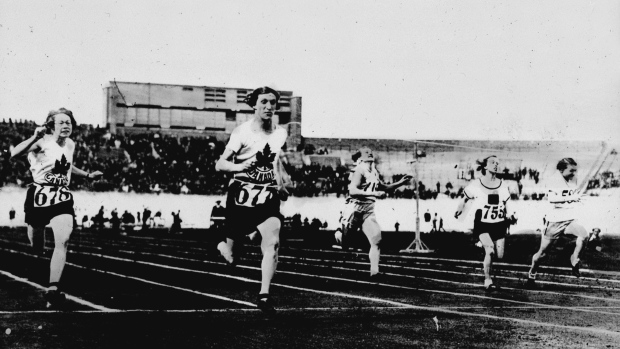
August 5, 1928 – Nicknamed “Bobbie” because of her bobbed hairstyle, Toronto’s Fanny Rosenfeld captured silver in the women’s 100 metres at the 1928 Summer Olympics in Amsterdam. Days later, she anchored a team featuring Ethel Smith, Myrtle Cook and Jane Bell to a gold medal in the women’s 4 x 100 relay. A renaissance woman, Rosenfeld was also an accomplished hockey player, golfer and tennis champion. In 1978, the Canadian Press’s Canadian female athlete of the year award was renamed the Bobbie Rosenfeld Award in her honour. Rosenfeld won the award herself in 1950 as Canada’s top female athlete of the half-century.
--
February 5, 1948 – A year after announcing her presence on the world stage with a gold medal at the worlds, Ottawa’s Barbara Ann Scott won gold in women’s figure skating at the 1948 Winter Olympics in St. Moritz. Nicknamed “Canada’s Sweetheart,” Prime Minister Mackenzie King said of Scott that "Canadians courage to get through the darkness of the post-war gloom.” To this day, Scott remains the only Canadian women to win gold in that event.
--
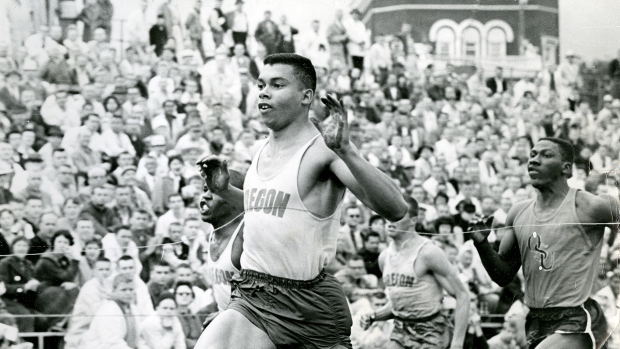
October 15, 1964 – At the 1964 Summer Olympics in Tokyo, Prince Albert, Saskatchewan’s Harry Jerome – grandson of Canadian Olympian John Howard and brother of Canadian Olympian Valerie Jerome – wins a bronze medal in men’s 100 metres. His time of 10.3 seconds equaled the old Olympics record. During his career, Jerome, a star runner at the University of Oregon, would win gold in both the Commonwealth Games and the Pan Am Games. From 1963 to 1966, Jerome held or equaled four different world records at the same time.
--
February 16, 1968 – At the 1968 Winter Olympics in Grenoble, Ottawa’s Nancy Greene dominated on the slopes. Two days after capturing silver in the slalom, Greene won gold in the giant slalom, ending the traditional European domination of the sport. She would win the Lou Marsh Trophy in both 1967 and 1968. By 1975, Greene was the winner of 14 World Cup races and a Canadian champion six times. In 1999, the Canadian Press named Greene Canada’s Female Athlete of the Century.
--
July 18, 1976 – At the Montreal Summer Olympics, 15-year-old Romanian gymnast Nadia Comaneci received gymnastics’ first ever perfect 10 score for her uneven bars routine during the team competition. Because the perfect 10 was thought to be impossible, the scoreboards were unable to display a 10, listing her score as 1.0. Comaneci would go on to receive six more 10s during those Olympics on her way to three gold medals, a silver and a bronze.
--
February 16, 1984 – In capturing the gold medal in the men’s 1500 metres at the 1984 Winter Olympics in Sarajevo, Quebec City’s Gaeten Boucher won his second gold of those games and his third medal in total. Boucher became the first Canadian to have won three medals at an Olympics and held the record until Cindy Klassen won five in Torino in 2006. For his Olympics performance, Boucher was the winner of the 1984 Lou Marsh Trophy.
--
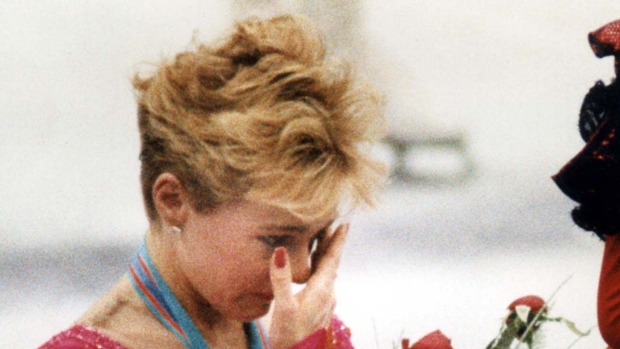
February 27, 1988 – Overshadowed by the so-called “Duel of the Carmens” between Katarina Witt of East Germany and the United States’ Debi Thomas (both women chose the same piece of music – Bizet’s Carmen – for the long program), Ottawa’s Elizabeth Manley stunned the audience with a nearly flawless long program to capture silver at the 1988 Calgary Winter Olympics. Manley actually defeated Witt in the long program, but Witt’s score in the short program was enough to lift her to gold. Manley would go on to retire from active competition later that year following the world championships in which she also won silver.
--
September 27, 1988 – From hero to goat, Ben Johnson’s life turned upside down in three days. Seventy two hours after setting a new world record (9.79) en route to capturing the gold medal in the men’s 100 metres at the 1988 Summer Olympics in Seoul, Johnson was stripped of the medal and the record when it was discovered that his blood and urine samples contained stanzolol, an anabolic steroid. Johnson also admitted to having been on steroids during the 1987 world championships in which he also won gold in the event. The scandal was the impetus for the Dubin Inquiry, in which Ontario Appeal Court Chief Justice Charles Dubin heard months of testimony about the use of performance-enhancing drugs in Canadian amateur sport. To this day, Johnson’s coach, Charlie Francis, insists Johnson was made a scapegoat for a sport in which cheating and blood doping were rampant.
--
October 2, 1988 – Though boxing at the 1988 Summer Olympics in Seoul might be best remembered for Roy Jones Jr. losing a gold medal controversially and a referee getting jumped post-match, there was also a meeting between two future heavyweight champions of the world for the gold medal in the super heavyweight division. The United States’ Riddick Bowe took on Kitchener, Ontario’s Lennox Lewis for gold. Lewis advanced to the semis after a :30 knockout and might it to the finals in a walkover. In the gold-medal fight, Lewis was too much for Bowe, winning the gold medal by referee stoppage in the second round. Though both men would go on to lengthy and successful careers as professionals in the same division, it would be the only ever meeting between Lewis and Bowe.
--
May 15, 1992 – A silver medalist in the women’s double sculls at the 1984 Summer Olympics in Los Angeles, Mississauga, Ontario’s Silken Laumann was considered a heavy favourite for a podium finish at the Barcelona Summer Olympics in 1992. But months earlier, Laumann was involved in collision with a German coxless pairs team and badly damaged her leg. The Olympics appeared to be completely out of the question for Laumann. But five operations later, Laumann was miraculously training again by the end of June and did, in fact, compete in the Olympics where she claimed a bronze. In recognition of her perseverance, Laumann was named flagbearer for the closing ceremonies and won the Lou Marsh Trophy that winter.
--
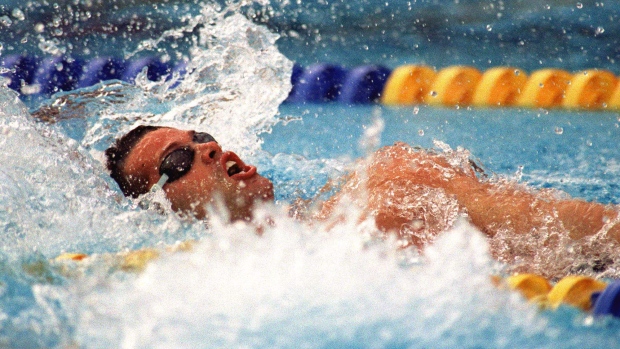
July 30, 1992 – After no medals in the pool for Canada at the 1988 Summer Olympics in Seoul, Calgary’s Mark Tewksbury got Canada back on the podium in Barcelona at the 1992 Summer Olympics. Tewskbury claimed gold in the men’s 100 metres backstroke with a time of 53.98, edging Jeff Rouse of the United States. That wasn’t it for Tewksbury, though. Along with Stephen Clarke, Jonathan Cleveland, Marcel Gery and Tom Ponting, Tewksbury claimed a bronze in the men’s 4 x 100 metres medley relay for Canada. Tewksbury called time on his career after the Games.
--
August 6, 1992 – Montreal’s Sylvie Frechette headed to the 1992 Summer Olympics in Barcelona with a heavy heart. A week prior to the Games, Frechette’s fiancé took his own life. But Frechette went to Spain undaunted and put in a memorable performance in the women’s solo synchronized swimming event. Frechette initially won a silver medal in the event, finishing behind American Kristen Babb-Sprague, but a Brazilian judge admitted to accidentally entering an 8.7 score, rather than the 9.7 score that would have given her gold. After an appeal by the Canadian Olympic Committee, a gold was awarded to Frechette.
--
February 27, 1994 – In drama, the principle of Chekhov’s Gun is simple: Don’t introduce a gun in the first act if it’s not going to go off in the final act. In the hockey competition of the 1994 Winter Olympics in Lillehammer, that principle might as well have been called Forsberg’s Stick. Prior to those Games, the International Olympic Committee adopted a shootout rule to end knockout round competitions and – wouldn’t you know it – that’s where the gold-medal game between Canada and Sweden was headed after a gripping 2-2 encounter where overtime solved nothing. In the sixth round, Paul Kariya, who scored in the second round, was stopped by Tommy Salo, leaving Peter Forsberg with a chance to claim gold. The future Hall of Famer made no mistake with a beautiful dangle – now memorialized on a postage stamp in Sweden – past Corey Hirsch to win gold for the Tre Kronor.
--
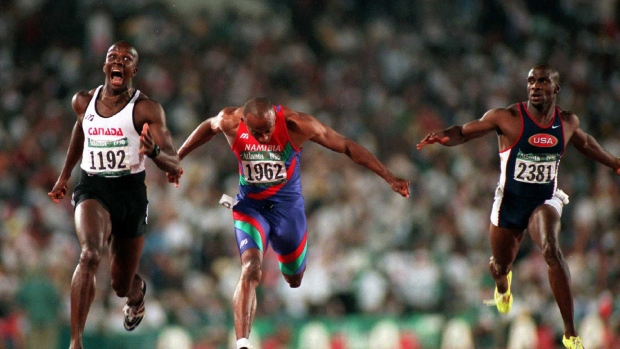
July 27, 1996 – With the memories of Seoul and Ben Johnson still fresh in the mind of Canadians, the nation’s next sprinting star lived up to the hype. Oakville, Ontario’s Donovan Bailey stormed onto the world stage by claiming double gold at the 1995 World Championships in Athletics in Gothenburg, Sweden in the men’s 100 metres and the 4 x 100 metres relay. With a big showing expected in Atlanta, Bailey became the world’s fastest man in Atlanta, winning gold in the 100 metres and setting the new world record of 9.84 seconds in the event. Bailey’s record would hold for three years before being broken in 1999 by rival Maurice Greene.
--
August 3, 1996 – A week after Donovan Bailey’s gold-medal triumph in the 100 metres, he was primed for another golden performance. Heading into the race the Canadian team, with Bailey, Bruny Surin, Glenroy Gilbert, Robert Esmie and Carlton Chambers, was considered a contender, but the spotlight was firmly on the United States squad that potentially featured Carl Lewis looking for a 10th gold medal in his fourth Olympic Games (he did not race). As it turned out, the spotlight should have been focused a little bit to the north. The Canadians blew away the Americans and the rest of the field, taking the gold in 37.69. Bailey apologized to his teammates after the race for celebrating prematurely and lifting his arms in the air as they had come only .29 seconds away from the world record.
--
February 8, 1998 – Vancouver’s Ross Rebagliati claims gold in the men’s giant slalom at the 1998 Winter Olympics in Nagano becoming the first person to win an Olympic medal in snowboarding. That wasn’t where the story ended for the affable Rebagliati, though. Three days later, Rebagliati was stripped of his medal after testing positive for marijuana. Rebagliati insisted that the smoke was secondhand and he recovered his medal after an appeal five days after it was stripped. Rebagliati became a media sensation during the scandal, appearing on The Tonight Show with Jay Leno. Since the Olympics, Rebagliati has become a medical marijuana advocate in BC and even considered a political run in 2009.
--
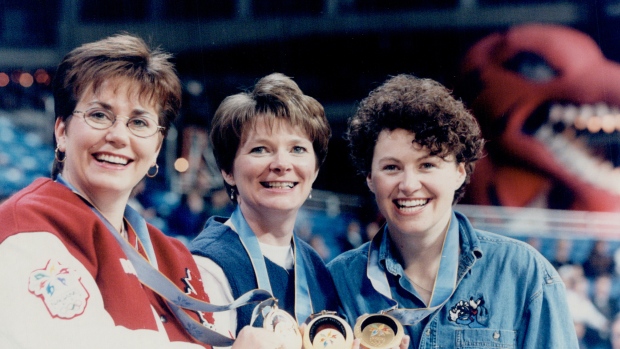
February 15, 1998 – Sandra Schmirler’s rink of Jan Betker, Joan McCusker and Marcia Gudereit defeat Denmark 7-5 to win gold in women’s curling at the 1998 Winter Olympics in Nagano. It was the first time that curling was a medal event at an Olympic Games. Schmirler’s rink dropped only a single draw on their way to gold. Schmirler, a three-time winner of both the Scotties Tournament of Hearts and the World Curling Championships, passed away in 2000 at the age of 36 following a cancer diagnosis.
--
February 20, 1998 – For the first time at the 1998 Winter Olympics in Nagano, National Hockey League players would compete in the Games and expectations for a Canadian team featuring the likes of Wayne Gretzky, Patrick Roy and Joe Sakic were high. A few feathers were ruffled when Eric Lindros was named captain of the squad ahead of the elder Gretzky, but there was no apparent discord as Canada tore through the round-robin stage, scoring 12 goals and only conceding three against Belarus, Sweden and the United States. After brushing aside Kazakhstan in the quarterfinals, Canada took on the Czech Republic in the semis. In a game scoreless until the third period, Jiri Slegr scored for the Czechs just before the halfway mark and they appeared on course for a stunning upset. Canada wouldn’t bow out quietly, though, as Trevor Linden forced overtime with just over a minute remaining. When OT solved nothing, both teams headed to the shootout. Robert Reichel scored the only goal as Dominik Hasek – who made 24 saves in regulation and overtime – turned away attempts from Theoren Fleury, Brendan Shanahan, Raymond Bourque, Joe Nieuwendyk and Lindros to propel the Czechs into a surprise gold-medal game. In the aftermath of the loss, questions were asked of coach Marc Crawford as to why Gretzky wasn’t a participant in the shootout. At the behest of Gretzky, the rest of Team Canada stayed at the Games until the closing ceremonies. The Czechs went on to capture gold.
--
November 10, 1999 – In an attempt to help combat doping in sports, the World Anti-Doping Agency (WADA) is founded in Lausanne, Switzerland with St. Catharines, Ontario native Dick Pound at its head. A former Olympic athlete himself – Pound represented Canada in swimming at the 1960 Summer Olympics in Rome – and member of the International Olympic Committee, Pound served as WADA president until 2007. In 2015, Pound chaired the WADA commission investigating doping in Russian sports and uncovered a state-sponsored doping scandal resulting in the stripping of 37 Olympic medals.
--
September 17, 2000 – At the 2000 Summer Olympics in Sydney, Kitchener, Ontario’s Simon Whitfield turned the brink of disaster into a gold medal in the men’s triathlon. After a massive crash in the cycling portion caused Whitfield and 14 other men to fall to the ground, he blew by the rest of the field on foot to claim gold with a time of 1:48:24.02. Whitfield’s time stood as the Olympic record for 12 years. Eight years later in Beijing, Whitfield would win a silver in the same event.
--
October 1, 2000 – A wrestling legend at Simon Fraser and the winner of 116 bouts, Daniel Igali became a gold medalist at the 2000 Summer Olympics in Sydney. Defeating Russia’s Arsen Gitinov in the gold-medal match in the men’s 69 kg freestyle event, the Nigeria-born Igali became the first Canadian man to win gold in Olympic wrestling. Two years later, Igali would go on to win gold at 74 kg at the Commonwealth Games in Manchester.
--
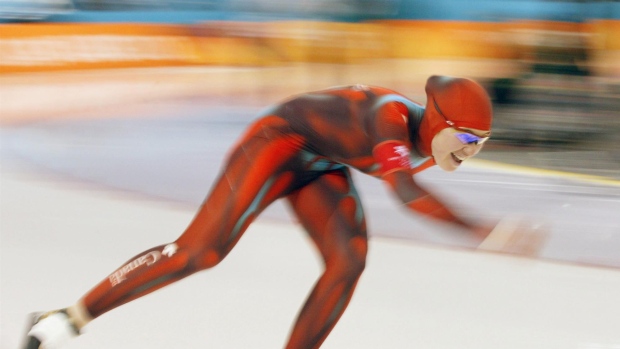
February 3, 2002 – Winnipeg’s Clara Hughes captures a bronze in the women’s 5000 metres speed skating event at the 2002 Salt Lake City Winter Olympics. In doing so, Hughes became the first Canadian and second woman ever to have won medals at both Winter and Summer Olympics games. In 1996, Hughes won a pair of bronzes at the Atlanta Summer Olympics in cycling. Hughes would go on to win three more Olympic medals in speed skating, including a gold in the same event in Torino in 2006.
--
February 13, 2002 – Saskatoon’s Catriona LeMay Doan sets a new Olympics record in women’s 500 metres speed skating event at the 2002 Winter Olympics in Salt Lake City with a time of 37.30 in her first race. Not only did LeMay Doan win gold in the event, but she did something no other Canadian had done before – defended her title. LeMay Doan also claimed gold in the same event four years earlier at the 1998 Winter Olympics in Nagano.
--
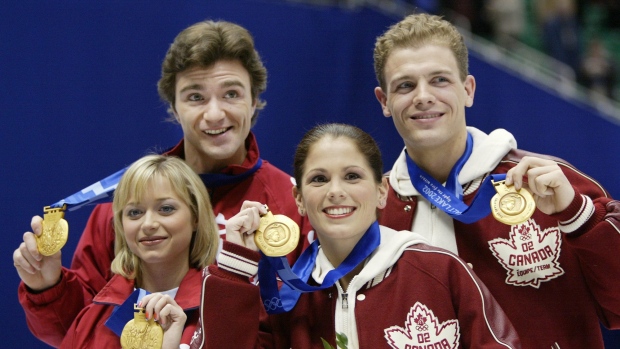
February 17, 2002 – Canadian pair Jamie Sale and David Pelletier were finally gold medalists at the 2002 Salt Lake City Winter Olympics. Though Sale and Pelletier skated a more technically sound free skate, the pair finished second behind Russian pair Elena Berezhnaya and Anton Sikharulidze. Six days later, though, Sale and Pelletier had their silver medals upgraded to gold when it was determined that the French judge, Marie-Reine Le Gougne, cast her vote for the Russian pair under duress from the head of the French skating organization as a means to glean an advantage for the French couple in the upcoming ice dance competition. Since Berezhnaya and Sikharulidze had nothing to do with the scandal, they kept their medals, meaning that two sets of golds were awarded for the first time ever.
--
February 24, 2002 – After a tournament that saw Canada bend, but not break and usually reserved general manager Wayne Gretzky unleash a fiery tirade against those wanting Canada to fail, Canada won its first Olympic gold medal in 50 years with a 5-2 victory against the United States. Canada got a goal from Paul Kariya, finally claimed gold after his heartbreak in Lillehammer, on a gorgeous feint from Mario Lemieux and a pair each from Jarome Iginla and Joe Sakic, whose second goal was memorably called by an exuberant Bob Cole.
--
February 11, 2006 – After narrowly missing out on a bronze medal as an 18-year-old in 2002 at the Winter Olympics in Salt Lake City, Spruce Grove, Alberta’s Jennifer Heil got finally got her hardware in style. Heil was only 1/100ths of a second away from reaching the podium four years previous, but there would be no doubt in Torino. Heil won gold in the moguls event, giving Canada its first gold medal of the 2006 Winter Games. Four years later, Heil would win Canada’s first medal yet again in Vancouver, this time a silver.
--
February 25, 2006 – Cindy Klassen of Winnipeg wins a bronze in the women’s 5000 metres speed skating event at the 2006 Winter Olympics in Torino to become the first ever Canadian to win five medals at a single Olympic Games. Klassen claimed a gold in 1500m, a silver in the 1000m, a silver in the team pursuit and a bronze in the 3000m. She had previously won a bronze at the 2002 Salt Lake City Winter Olympics. Klassen would be Canada’s flagbearer for the Torino closing ceremonies and go on to win the Lou Marsh Award that year as Canada’s top athlete.
--
September 16, 2008 – Four years after tying Stephanie Dixon’s mark of five gold medals at a Paralympics Games, Chantal Petitclerc did it again at the 2008 Beijing Summer Paralympics. Following golds in the women’s 100 metres T54, 200 metres, 400 metres T54 and 800 metres T54, the native of Saint-Marc-des-Carrieres, Quebec won a fifth gold in the 1500 metres T54, repeating her triumphs from Athens in 2004. Appointed to the Canadian Senate in 2016, Petitclerc concluded her Paralympics career with 21 medals, including 14 golds.
--
February 12, 2010 – Tragedy struck the 2010 Winter Olympics in Vancouver before they even begin. In his final training run at the Sliding Centre in Whistler, 21-year-old Georgian luger Nodar Kumaritashvili lost control on the second-to-last turn and was thrown into a metal support pole while traveling more than 143 KPH at the time of impact. Though he was able to receive treatment almost immediately and was airlifted to a medical facility, he succumbed to his injuries later that day. A moment of silence was held for Kumaritashvili during the opening ceremonies.
--
February 14, 2010 – In both the 1976 Montreal Summer Olympics and the 1988 Winter Olympics in Calgary, Canadian athletes were unable to strike gold as hosts, but Alexandre Bilodeau was out to change that in Vancouver. The Rosemere, Quebec native beat Australia’s Dale Begg-Smith to win gold in the men’s moguls to become the first Canadian to claim gold on home soil. On top of the momentous occasion for Canadian sports, Bilodeau’s win is remembered for the exuberant celebration of his younger brother, Frederic, who cheered him on nearby.
--
February 25, 2010 – After learning of her mother’s untimely death ahead of the short program, Montreal’s Joannie Rochette chose to continue on with her Winter Olympics dream in Vancouver. Rochette finished third in both the short program and free skate to capture the bronze medal. It was only Canada’s fifth ever medal in women’s figure skating. Two days later at the Games’ figure skating gala, Rochette skated to a Celine Dion song in tribute to her mother. Rochette served as Canada’s flagbearer at the closing ceremony.
--
March 21, 2010 – With her fourth gold medal at the 2010 Vancouver Winter Paralympics, Calgary’s Lauren Woolstencroft helped set a new best for golds at a Paralympics making it the nation’s seventh. Not only was there more to come for Woolstencroft, but she was about to enter rarified air. Woolstencroft struck gold in the women’s super combined – standing for her fifth gold of the Games. That gold tied Chantal Petitclerc and Stephanie Dixon for most golds by a Canadian, but both were Summer Olympians. That means Woolstencroft set the record for a gold haul by any Canadian at a Winter Olympics or Paralympics.
--
August 4, 2012 – After a concussion knocked her out of the 2012 Canadian Trampoline Championships that May, King, Ontario’s Rosie MacLennan remained cautiously optimistic about her chances at the 2012 Summer Olympics in London. And with good reason. Competing in her second Olympics, MacLennan edged China’s Huang Shanshan by .575 points to capture gold in the women’s individual competition. It was Canada’s only gold medal of the London Games. MacLennan would go on to repeat the feat four years later in Rio de Janeiro, winning her second gold medal in the event.
--
February 19, 2014 – Defeating the American duo of Elana Myers and Lauryn Williams by one-tenth of a second, the Canadian bobsleigh duo of Kaillie Humphries and Heather Moyse claimed gold at the 2014 Winter Olympics in Sochi. In doing so, the pair became the first ever women to defend their titles in the event after having previously won gold four years earlier in Vancouver.
--
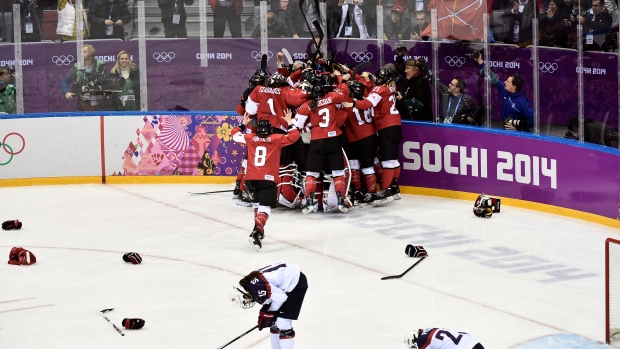
February 20, 2014 – A win in the gold-medal game in women’s hockey at the 2014 Sochi Winter Olympics and Team Canada would accomplish a lofty feat – tying the Soviet Union’s mark from 1964 to 1976 of four straight Olympics gold medals. Naturally, the archrival Americans would be in Canada’s way and weren’t in any mood for history being made. With a little under four minutes remaining in the third period, the Americans held a 2-0 lead on goals from Meaghan Duggan and Alex Carpenter, but Canada would not be denied. First, Brianne Jenner would pull one back with 3:26 remaining in regulation as her shot deflected off an American defender. Canada pulled goaltender Shannon Szabados for the extra attacker and, with the empty net, the US hit the post with 1:25 left as Canada’s good fortune continued. With 54.6 seconds remaining, Marie-Philip Poulin corralled a loose puck in front of the American goal and beat Jessie Vetter to send the game to overtime. After Szabados made a pair of brilliant saves in OT, Canada went to work on the powerplay when Hilary Knight brought down Hayley Wickenheiser. At the 8:10 mark of OT, Poulin sniped home her second to give Canada the gold medal. Make it four.
--
August 6, 2016 – Along with Michelle Williams, Taylor Ruck, Chantal Van Landeghem, and Sandrine Mainville, Toronto’s Penny Oleksiak captured bronze in the women’s 4 x 100 metre freestyle relay at the 2016 Summer Olympics in Rio de Janeiro. It was Canada’s first women’s freestyle relay medal in 40 years. In winning the medal, Oleksiak became the youngest Canadian to ever win an Olympic medal. But she wasn’t done, claiming silver in the 100 metre butterfly, bronze in the 4 x 200 metre freestyle relay and a gold in the 100 metre freestyle. That gold meant that Oleksiak was the first gold medalist to be born in the 2000s. For her four-medal performance, Oleksiak won both the 2016 Bobbie Rosenfeld and Lou Marsh Awards.
